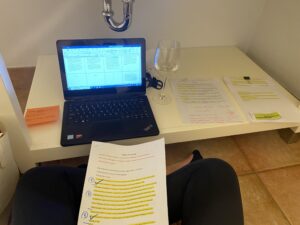This course was super interesting to me and was my first introduction to Solution-Focused Therapies, a modality that I would soon begin using most often in my school counselling practice. We had the opportunity to work through many different theories and approaches in counselling and use them to piece together our own theory of change. This paper was a beast, but there was a ton of learning that I walked away with!
I was now balancing being a working mom and student, which meant that I got to fin ish this paper around midnight in a Winnipeg hotel bathroom (while my family slept) the night before leaving for a family holiday to Florida! Definitely nothing to complain about, but I remember the relief I felt after proof-reading my work by the pool and hitting send before quickly stuffing my laptop away for the rest of the trip!
ish this paper around midnight in a Winnipeg hotel bathroom (while my family slept) the night before leaving for a family holiday to Florida! Definitely nothing to complain about, but I remember the relief I felt after proof-reading my work by the pool and hitting send before quickly stuffing my laptop away for the rest of the trip!
I really enjoyed Breanne Lawrence who was our professor for the course, and immediately looked up to her. Not only was she a kind, smart, well-spoken professor with her PhD but she was also a working mom so I immediately had a ton of respect for her. Later in my group counselling course, we would get to work with her better half which was a cool experience too!
I once again felt intimidated by the course outline, feeling like I was a bit of an imposter being in the guidance counsellor role with limited knowledge of all the theories that were out there. I worried that I was in such an important position and that I might do my students a disservice if I didn’t pull up my socks and get to knowing all of the different theories that could work for them. I was relieved once I better understood a few of them though, realizing that I would only ever be practicing the approaches that I understood and could back up with evidence, should anyone ever ask.
I would also soon understand that in my school role, I would not be using all of these approaches nearly as much as a private counsellor would. Instead, I needed to make sure I understood them well enough to use as an intervention when needed. The exception to this for me is the Solution-Focused approach, which I use every single day at school. This theory gives us a way to look at any problem that a student may be having through a (you guessed it) solution-focused lens. I love helping students understand that they can solve their own problems by helping them reflect on and look for the exceptions to their problem. Using scaling questions is also an excellent way to show them that although the problem is still there, it is usually getting at least a little bit better when you seek solutions throughout your day.
I was now starting to feel very comfortable in my role at school, but Shaun and I were going through some difficult times at home. It had been just over six months since we had started trying for a younger sibling for Londyn, and although we were fortunate to have gotten pregnant, that joy was short-lived. Our pregnancy had not made it through the first term; we had joined what a friend would later call “the worst club on the planet”.
This loss, along with the loss of my 13-year-old husky that year, had definitely started to take a toll on me. I had experienced loss before, but nothing compared to the pain that I had felt in these last few months. Unfortunately for us, this was only the beginning of a long and painful journey, but one that we will continue to look for the lessons in.
Favorite Resources
The timing for this assignment was once again favorable for me as I still had a lot of room for development as a school counsellor. It is also interesting to look back to see if the theories that I believed I aligned with the most are still the same today, which they definitely are!
Micki Banks
Latest posts by Micki Banks (see all)
- Masters Portfolio - October 15, 2024
- Graduate Summative - October 15, 2024
- Expressive Therapies - October 15, 2024


